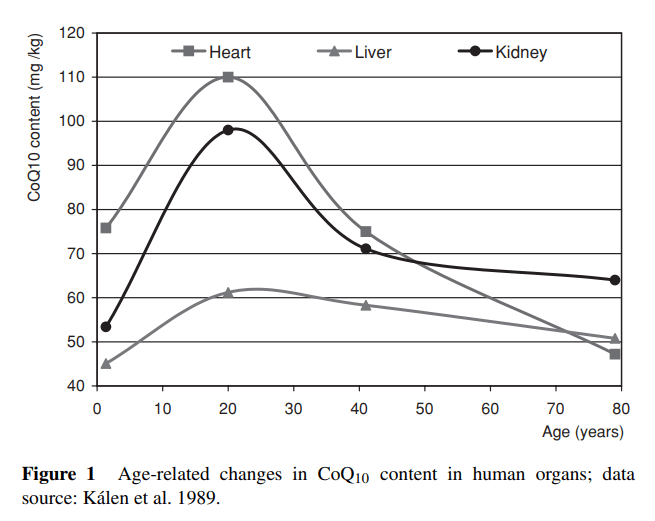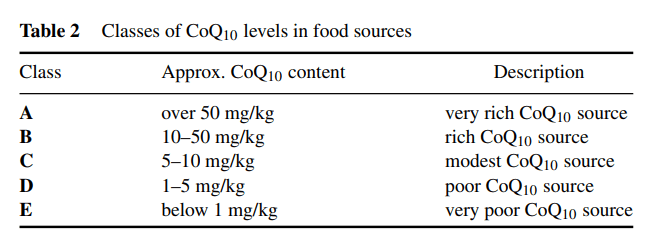Coenzyme Q10 (CoQ10) has been getting a lot of attention in recent years.
While the body can make it, it can also be found in many foods.
The most abundant sources of CoQ10 all happen to be animal products like fish, meat, dairy, and eggs.
However, there are plant sources as well. I’ve collected the most complete data I could find from studies and summarized it on this page.
Research on CoQ10 Importance
There’s not a ton of research on CoQ10 at the moment, and that research is pretty mixed. There’s no significant evidence proving or disproving the potential benefits of CoQ10.
So it might be important, we just don’t know yet. If you want to get a bit more to be on the safe side, that’s fine as long as you stay under the observed safe level of 1200 mg per day.
It could be especially important to focus on as you get older, since CoQ10 levels decline significantly with age.
Vegan Sources of CoQ10
Unlike other nutrients like iron and calcium, you can’t easily look up the amount of CoQ10 in foods.
However, some studies, like this one, have published the amount of CoQ10 in a fairly wide range of foods.
The top vegan ones are in the table below.
There are a few things I should mention:
- A few had big ranges (significant different values from different past studies), I took the average of them.
- Some foods didn’t have reliable values, so I excluded those from the list (just a few, not missing much).
- Note the weird units (a kilogram of food is a lot!) – Just know that anything over 10 in the chart is considered a good source of CoQ10.
Now onto the data:
| Food | CoQ10 (mg/kg) |
|---|---|
| Soybean oil | 166.4 |
| Olive oil | 82 |
| Peanut oil | 77 |
| Corn oil | 76 |
| Rapeseed oil | 68.5 |
| Sesame oil | 32 |
| Peanuts | 26.7 |
| Sesame seeds | 20.3 |
| Pistachio nuts | 20.1 |
| Walnuts | 19 |
| Cottonseed oil | 17.3 |
| Hazelnuts | 16.7 |
| Sunflower oil | 9.6 |
| Almond | 9.4 |
| Natto | 7.8 |
| Broccoli | 7.3 |
| Corn germ | 7 |
| Chestnuts | 6.3 |
| Wheat germ | 5.2 |
| Rice bran | 4.9 |
| Safflower oil | 4 |
| Sorrel | 3.6 |
| Chinese cabbage | 3.3 |
| Sweet potato | 3.3 |
| Sweet pepper | 3.3 |
| Garlic | 3.1 |
| Tofu | 2.9 |
| Pea | 2.5 |
| Cabbage | 2.1 |
| Millet | 1.4 |
| Buckwheat | 1.1 |
There’s a good range in foods that have a decent amount of CoQ10 in them.
Types of Plant-Based Foods With CoQ10
It’s pretty clear that the best vegan sources of CoQ10 are:
- Oils – All of the best vegan sources of CoQ10 are some form of oil (soybean, olive, peanut, corn). Cooking with a bit of oil can get you all the CoQ10 that you’ll need.
- Seeds – Sesame seeds appeared pretty high on the list. I suspect other seeds (e.g. chia, flax) also have quite a bit of CoQ10, but again, it’s hard to find complete data on this topic. Seeds are generally amazing in terms of vitamins and minerals, so it’s a good idea to eat them regularly.
- Nuts – Most nuts (including peanuts in this case) appear to have significant amounts of CoQ10. A good alternative if you’re not a big fan of using oils in your recipes. However, nuts have a lot of fat and calories, so try not to go overboard.
If you’re trying to get more CoQ10, focus on eating more of these plant-based foods on a regular basis.
Frequently Asked Questions About CoQ10
1. What are the specific potential health benefits of CoQ10?
Coenzyme Q10 (CoQ10) is a compound that plays a crucial role in the production of energy in the cells. It is also a potent antioxidant. Some of the potential health benefits of CoQ10 include (1):
- Heart Health: CoQ10 is often promoted for heart health. It may help improve symptoms of heart failure, support overall cardiovascular health, and reduce oxidative stress.
- Migraine Prevention: Some studies suggest that CoQ10 supplementation may reduce the frequency and severity of migraines.
- Antioxidant Properties: CoQ10 acts as an antioxidant, helping to neutralize free radicals and reduce oxidative damage in the body.
- Energy Production: CoQ10 is involved in the production of ATP, a molecule that stores and releases energy in cells.
2. Are there any risks associated with consuming high levels of CoQ10?
Generally, CoQ10 is considered safe for most people when taken as directed. However, high doses may lead to some side effects, including:
- Insomnia: Some individuals may experience difficulty sleeping.
- Upset Stomach: High doses may cause gastrointestinal issues.
It’s important to consult with a healthcare professional before taking high doses of any supplement.
3. How do CoQ10 levels in vegan sources compare to animal sources?
CoQ10 is found in various foods, and its levels can vary. While animal sources (such as meat, poultry, and fish) contain higher levels of CoQ10, vegan sources also provide it. Plant-based sources include:
- Spinach
- Broccoli
- Cauliflower
- Whole grains
- Legumes
Although the levels may be lower in vegan sources, a well-balanced vegan diet can still contribute to CoQ10 intake.
4. Is it necessary to supplement with CoQ10 if you follow a vegan diet?
It’s not necessarily required to supplement with CoQ10 on a vegan diet. A well-balanced and varied plant-based diet can provide essential nutrients, including CoQ10. However, individual needs may vary, and factors such as age, health conditions, and medications can influence CoQ10 levels.
If you have concerns about your CoQ10 levels or if you’re considering supplementation, it’s advisable to consult with a healthcare professional who can assess your specific situation and provide personalized advice.


